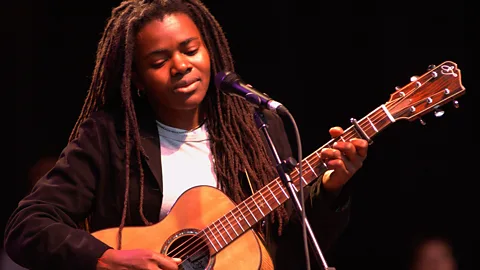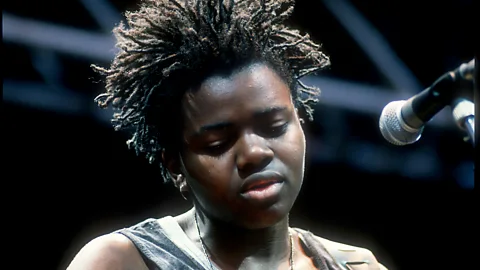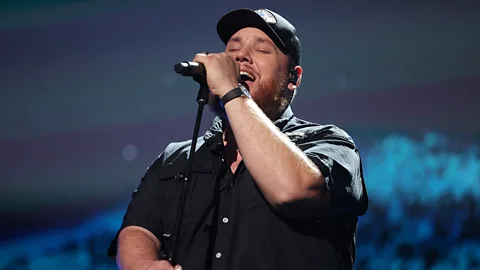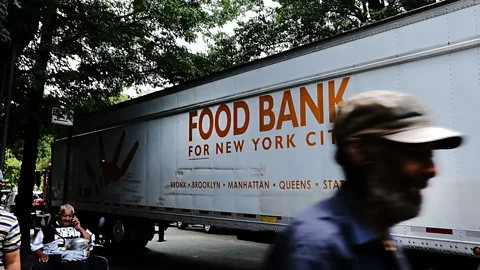By Nick LevineFeatures correspondent

 Getty Images
Getty ImagesTracy Chapman's beautiful song about escaping from poverty was everywhere this year, thanks to a hit cover by country star Luke Combs. Whatever the version, it hits harder than ever.
This year's most ubiquitous hits include Miley Cyrus's Flowers, a disco-tinged ode to self-care, and SZA's Tarantino-inspired revenge anthem Kill Bill. Meanwhile, Morgan Wallen's liquor-soaked love song Last Night spent an astonishing 16 weeks on top of the Billboard Hot 100. However, one of 2023's defining tunes isn't a freshly minted hit by a Gen Z or millennial superstar, but a country cover of a 35-year-old folk anthem.
More like this:
"I had a feeling I could be someone, be someone, be someone," Luke Combs sings yearningly on Fast Car, a song about escaping from poverty that was first made famous by its writer, Tracy Chapman, in 1988. Led by a finger-picked guitar intro that instantly evokes memories of Chapman's original, Combs' faithful but fuller-sounding version climbed to number two on the Billboard Hot 100 in July. When it was named song of the year by the Country Music Association in November, Chapman became the first black woman ever to receive this prestigious songwriting prize. Combs has been lauded, too, with a Grammy nomination for best country solo performance.

 Getty Images
Getty ImagesReleased as the lead single from her self-titled debut album, Chapman's Fast Car gained momentum when she performed it at Nelson Mandela's 70th birthday concert in June 1988. Chapman's LP had sold respectably since it came out that April, but the tribute concert at London's Wembley Stadium introduced her to a huge global audience watching on TV. The Cleveland-born singer-songwriter initially delivered a three-song set – consisting of Why?, Behind the Wall and Talkin' Bout a Revolution – in between comedy double act Fry and Laurie and Scottish band Wet Wet Wet. Then she benefitted from a fortuitous twist of fate.
Just as Stevie Wonder was about to begin a surprise set, he discovered that a hard disk containing his backing tracks had gone missing. Wonder decided he was unable to perform, so Chapman was asked to fill in at the last minute because she could come on quickly with just her guitar. Her stunning renditions of Fast Car and Across the Lines, a scalpel-sharp song about racial separation, made her a star and sent the album to the top of the charts around the world. Her eponymous debut went on to sell more than 20 million copies worldwide and earn a reputation as one of the all-time great singer-songwriter albums.
The Mandela concert performance also burned Fast Car into the popular consciousness, in particular – a place it has never really left thanks to consistent radio airplay over the years and popular cover versions including Combs's. "Every car journey I had as a child was soundtracked by that song," says British singer-songwriter Paloma Faith, who was seven years old when Chapman's Fast Car became a hit in the UK. After the Mandela concert, Chapman's impossibly tender and affecting song also gained more exposure in her native US, where it peaked at number six on the Billboard Hot 100. The following year, Fast Car picked up three Grammy nominations, including one for best female pop vocal performance, which Chapman won.
How the song peaked in 2023
Still, this year's hugely popular cover version by Combs, a singer-songwriter from Nashville via North Carolina who has become one of country music's brightest new stars, has taken Fast Car to a brand new destination: number one on the Billboard country airplay charts. "I never expected to find myself on the country charts, but I'm honoured to be there," Chapman told Billboard in July. For Hugh McIntyre, a music journalist with Forbes, the fact that Combs recorded Fast Car in a different genre isn't necessarily a key component of the cover's success. "I think his version has struck a chord largely because of the song itself," he says. "Combs has a big enough platform to reach people who either didn't know the song or do remember it, but perhaps haven't heard it in a while."
However the success of Combs' cover wasn't viewed by everyone as a wholly positive development. In July, The Washington Post's Emily Yahr wrote an article titled Tracy Chapman, Luke Combs and the complicated response to Fast Car in which she argued that the song's chart-topping success has been partly "clouded by the fact that, as a black queer woman, Chapman, 59, would have almost zero chance of that achievement herself in country music". Indeed, when Combs's Fast Car climbed to the top spot, Chapman became the first black woman ever to have a sole songwriting credit on a number one country song.

 Getty Images
Getty ImagesCourtney Smith, music critic and author of Record Collecting for Girls, says she "did a double take" when she first heard Combs's cover version because it retains a broad musical similarity to Chapman's original. "I was surprised that a white man in country music would have connected with a song that was released two years before he was born," she says. "And even more surprised that he recorded it, and his label made it a single." For Smith, Combs’s unexpected choice of cover "speaks to the nostalgia in the country genre but pushes it away from a nostalgia for rock music and towards something less definitively Southern and male".
While Combs's version could be viewed as an example of cultural appropriation – or at least of a white man benefitting disproportionately from a black woman's handiwork – it also underlines the universality of the beautifully expressed sentiments in Chapman's songwriting. Fast Car's evocative opening salvo – "You got a fast car, I want a ticket to anywhere" – resonates with anyone who's ever craved a better station in life. For her part, Chapman has responded graciously to Combs's success, saying in her Country Music Association acceptance speech: "I'm sorry I couldn't join you all tonight. It's truly an honour for my song to be newly recognised after 35 years of its debut. Thank you to the CMAs and a special thanks to Luke and all of the fans of Fast Car."
Certainly, Combs isn't the first artist to rework Chapman's classic for a new audience. In 2015, British DJ-producer Jonas Blue released a tropical house cover of Fast Car that became a sizeable chart hit in Australia, the UK and many other European countries. In an interview with Idolator, Blue admitted that he was initially "scared" to record Fast Car because "it's such a legendary song [that] it's like trying to cover The Beatles". McIntyre believes Fast Car's success in several different genres points to the transcendent quality of its subject matter. "There is a feeling embedded within the lyrics that is hard to describe, but Chapman has so brilliantly and beautifully put words to it," he says.
Why its lyrics resonate so powerfully
Though difficult to pinpoint, this feeling is ineffably wistful and incredibly poignant. Fast Car begins with the narrator – who is never named or gendered – dreaming of a better life after managing to save "just a little bit of money" from their work at a convenience store. In the third verse, we learn that the narrator had a tough start in life because their father drank and their mother walked out. "I said, 'Somebody's gotta take care of him', so I quit school and that's what I did," they tell us, heartbreakingly. Though the narrator is initially optimistic because their romantic partner appears to have prospects – "I know things will get better, you'll find work and I'll get promoted" – at the song's climax we hear that history has cruelly repeated itself. The narrator is still working hard to provide for someone, this time their partner, who now stays "drinking late at the bar". The narrator's feeling that they "could be someone, be someone, be someone" is just a distant memory.
Chapman has said that while Fast Car isn't "directly autobiographical", it was partly inspired by her own hardscrabble childhood. "It very generally represents the world that I saw when I was growing up in Cleveland, Ohio, coming from a working-class background, being raised by a single mom and being in a community of people who were struggling," she said on the BBC radio show Striking a Chord. Though the song's optimism ultimately dissipates, the image of a "fast car" speeding away from a difficult situation remains extremely powerful. "It inspired a sense of freedom in me and liberation to choose who I am and where I go, and reminds me I can leave whenever I want," says Faith who, like Chapman, was raised by a lone mother in a working-class neighbourhood.

 Getty Images
Getty ImagesIt is surely no coincidence that Combs's version of Chapman's aspirational tale has taken off in a year when so many people are struggling financially. In October, it was reported that the US has seen the largest one-year poverty rate increase in history, with 12.4% Americans now living in poverty. Meanwhile, the UK is currently mired in an ongoing cost-of-living crisis: country music's audience is smaller there, but Combs's Fast Car has spent a very creditable 28 weeks in the UK singles charts. But at the same time, there is something timeless about Fast Car's message of grafting and grasping. Over the years, it has also been embraced as a queer anthem, notwithstanding the fact that Chapman, a staunchly private person, has never spoken publicly about her own sexuality. In a 2018 article for LGBTQ+ website INTO, writer Trish Bendix notes that "the way Chapman sings about a genderless couple leaving town to find a home in a city nearby is something all queer people can relate to".
Chapman has also protected Fast Car's integrity by almost never granting permission for other artists to sample it. British soul singer Gabrielle has said that the original unreleased mix of her 1993 single Dreams contained a "tiny sample" of Fast Car that had to be removed because she "couldn't get [it] cleared". This highly selective approach only adds to Chapman's image as a discreet and deeply principled musician who does things on her own terms. She hasn't released a new studio album since 2008, and said in 2015 that she has no intention of joining social media despite being "strongly urged" to do so by her record label. On one level, Fast Car has transcended its folk song origins to become a modern standard that works in any genre. But on another, it is impossible to separate this heartfelt and profoundly moving song from the compassionate and completely authentic artist who wrote it.
If you liked this story, sign up for The Essential List newsletter – a handpicked selection of features, videos and can't-miss news delivered to your inbox every Friday.
Fast Car: Why a 35-year-old folk anthem became one of the songs of 2023 - BBC.com
Read More
No comments:
Post a Comment